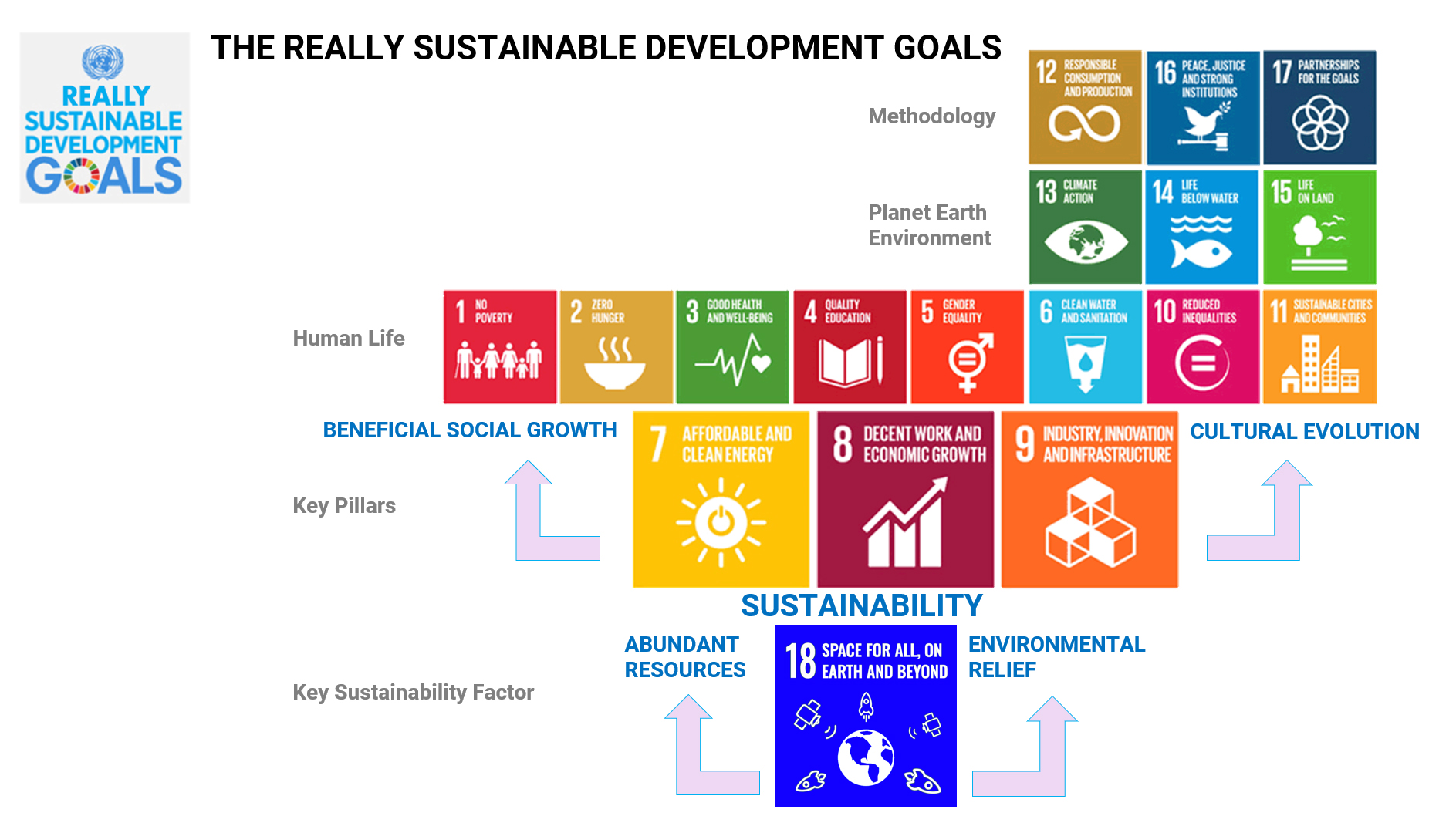
An 18th SDG: Space for All – Civilian Space Development and Life beyond Earth
United Nations General Assembly Science Summit – 15 September 2023, New York, 15:00 US EDT
See the list of the proposer organizations See who signed so far
Join your Organization to the Space 18th SDG Coalition
Sign the Change.org petition 
AIMS AND OBJECTIVES
Since 2015, reusable rockets have dramatically decreased the cost of transportation from Earth to orbit. Such process is paving the path toward civilian space development and astropolitical uses of space as well, and is creating a growing interdependent relationship between life on and beyond Earth. 2015 can now be identified as a “turning point” in history, signifying a change of paradigm, from “traditional” aerospace to a “new space” age.
As soon as the U.N. 2030 Agenda[1] was published, some relevant criticalities appeared. The general criteria supporting the concept of sustainability developed by the agenda is an unquestioned limitation to the boundary of Earth’s atmosphere. The 2030 Agenda for Sustainable Development, adopted by all United Nations Member States in 2015, was conceptualized during the traditional aerospace age: outer space was not considered, as a dimension that helps to increase the sustainability of development. Space science and technologies are supporting social and environmental goals on Earth, for many years. Yet that will not be enough, to warrant a really sustainable development. To allow a real sustainable development, it is indispensable and urgent to start civilian space development, outside Earth boundaries. Therefore the UN 2030 Agenda of the Sustainable Development Goals needs to be updated. We propose an 18th SDG to be added: “Space for All, on Earth and Beyond”, a civilian-led space development, with human communities living and working in outer space to expand and multiply benefits to all the peoples of Earth.
ABSTRACT
It is widely believed that sustainability means nothing else than reducing human activities on Earth, in order to decrease our ecological footprint on this planet. But that would imply a rapid decay of civilization. As stated in the 1986 U.N. resolution, development is a universal civil right[2]. In accordance with the right to development[3], we propose a more advanced concept of sustainability: the only way, for 8 billion terrestrials, to moderate their footprint on Earth would be to commence development elsewhere. Expanding civilization into space will progressively relocate industries off Earth, and consequently relieve the burden of our development on home planet. Earth’s green lungs and seas will regenerate themselves, Mother Earth will “take a breath”, and human civilization will resume growth and become more inclusive. We believe the only sustainable development, for 8 billion terrestrials, is in outer space, beyond Earth’s atmosphere – and we will need to launch civilian space development, before 2030 (as afterwards could be too late). In order for civilian space development to launch before 2030, some issues should be tackled with higher priority, especially with respect to the current priorities for space agencies, the space industry in general and the space research community at large.[4]
Civilian space development refers to enabling humans to live and work in space for long periods of time, and eventually to reside in space habitats (in the near term) – both on planetary surfaces and in large orbital infrastructures. There are both economical and biological challenges, to be addressed (and as soon as possible). To make human enterprise in space profitable, the cost of transport from Earth to orbit must decrease. Rockets reusability is already addressing this, and fully reusable space vehicles will bring the cost per kg under $1000. Producing fuel in space, from both Moon and asteroids resources, will help lower the cost further, to under $100/Kg[5]. Yet economic issues are not the only concerns. Biological issues are even more important. Safety, ergonomics and smooth acceleration of passenger space vehicles will be fundamental, to enable untrained civilians to travel to and work in space. Protection from solar and cosmic radiations will also be critical. Commencing work on simulated gravity (to avoid physiological damages experienced by astronauts on orbital space stations) is very urgent. Enabling green environments in space habitats, all the measures to support and preserve health (both physical and psychological), and experimenting self-sustaining closed ecosystems, are also of primary importance.
Adding the 18th SDG to the 2030 Agenda will give evidence to the above process, and provide the urgent and necessary information to the large public opinion about the rationales and profound humanist reasons to expand civilization beyond Earth.
EXPECTED OUTCOMES
Adding the 18th SDG to the UN 2030 Agenda will achieve the following outcomes, at least:
- to upgrade the 2030 Agenda after major changes occurred in the global society, namely the booming new space economy
- real sustainability of the growth key pillar SDGs 7, 8 and 9[6], that will anymore conflict with the environmental SDGs[7]
- real sustainability of the social SDGs[8]
- attracting more investments in space
- unprecedented economic growth, reversing the global crisis
- a better understanding and sensitiveness, in the large public opinion, of the great and fundamental contribution of civilian space development to sustainable development
- revitalization of COPUOS and UNOOSA, moving them to talk to general public at large, achieving a role of political dealers and opinion leaders
Join your Organization to the Space 18th SDG Coalition 
Here’s an executive summary bullet points about the urgency and opportunity of an 18th SDG:
- Sustainability – Space needs to enter the equation of sustainability. The U.N. 2030 Agenda has 17 SDGs, and none of them even mention Space.
- Resolving conflicts among different SDGs – If limited to Earth’s boundaries, the SDGs related to energy, industrial development, both social and economic growth will conflict with the environmental SDGs.
- Making all 17 SDGs truly sustainable – Only an 18th SDG, fostering civilian space development, will make all of the other 17 SDGs truly feasible and sustainable, assuring achievement in social growth while allowing planet Earth’s green lungs and seas to regenerate themselves.
- Fixing the 2030 Agenda obsolescence – The U.N. 2030 Agenda was conceived during the previous space age, when Earth to orbit transportation costs were very high. Reusable launch vehicles helped reduce such costs, and will reduce them further. The 2030 Agenda should be updated accordingly.
- The 18th SDG title – We propose that an 18th SDG should be added: “Space for All – Civilian Space Development and Life Beyond Earth”.
- Social urgency of civilian space development – Initiating civilian space development before 2030 is most urgent. Humanity could fail the historical “launch window”, should Earthlings keep on growing up, or even worse our civilization to implode, in the closed environment of Planet Earth.
- Higher priority for some issues – The 18th SDG should promote higher priorities for some essential issues, such as:
- 100% reusable, safe and ergonomic space transportation vehicles, for passengers and cargo
- Protecting life and health from sun and cosmic radiations in space
- Start experimenting with simulated gravity in space
- Green environments (vegetable life) in space habitats
- Orbital debris recovery and reuse for geo-lunar space industrialization
- Moon and asteroid mining, to produce fuel in space
- Space based solar power (SBSP)
- Producing food in space
- History of Space and Science in schools – The history of space, as well as the history of scientific research, should be added to all education programs, all levels, from Primary to University. We need to teach the history of love, not just of empires and wars. Our children have to learn the history of the people who dedicated their life to humanity, for the progress of civilization. The 18th Sustainable Development Goal shall bring onboard this great educational value.
- Benefits of expanding Civilization into outer space – Civilization expansion into outer space, space settlements and industrialization – starting in Earth Orbit, the Geo-Lunar space region, Earth and Moon Orbits, and Lagrange Libration Points – will, at least:
- Relaunch the global economy to grow at an unprecedented pace, reversing the global crisis that’s gripping us since many decades in the closed Earth’s environment.
- Assure the material base for development of trillions of people in the solar system, transforming Planet Earth into a beautiful natural garden.
- Reduce the reasons for resource wars and conflicts, and help achieve peace on Earth.
- Give birth to the greatest cultural (r)evolution in human history so far, by developing thousands of communities in the Solar System.
- Progressively relieve planet Earth’s environment from the burden of human industrial development.
- Dramatically enhance of scientific knowledge of our solar system, exploring different planets environments to explore and comparing them to Earth’s environment, increasing our capabilities to understand planetary ecosystems, and to experiment where humans and the terrestrial biome will be the first biological things.
- The role of space advocacy – Space advocacy has a key role in addressing the above issues. We warmly invite all the space advocacy organizations to engage with the public to help explain why and how space development and further exploration can serve as the main pillar of truly sustainable development on Earth, as well as outside our home planet.
- Clearing space into daily political debates – The space advocacy movement should break the thin but hitherto impermeable diaphragm that keeps space topics out of the general political discussions.
- To save civilization and refresh Earth’s environment – Civilian space development should be presented as a major sustainable enterprise, as well as a strong factor undertaking that ultimately could save civilization and refresh planet Earth’s environment.
- To talk on popular generalist media – Elon Musk, Jeff Bezos and Richard Branson provide practical outreach, with their entrepreneurial initiatives. Yet, space development also needs some widely recognized social and political speakers, to engage with popular media.
- To spread the essential philosophical and political concepts – The 18th SDG campaign is a powerful mean to outreach to the public at large, spreading essential philosophical and political concepts related to space enterprise. Space development is not just a pursuit for wealthy pioneers and super-powers. It clearly is a vital enterprise for humanity.
We, the undersigned organisations and individuals, request that an 18th Sustainable Development Goal, focused on Outer Space Development, is added to the U.N. 2030 Agenda.
JOIN THE SPACE 18th SDG COALITION 
One more effort, to go viral: also sign the #Space18SDG on Change.org https://www.change.org/space18sdg
See the list of the proposer organizations See who signed so far
References
[2] Declaration on the Right to Development adopted 04 December 1986 by General Assembly resolution 41/128 https://www.ohchr.org/en/instruments-mechanisms/instruments/declaration-right-development
[3] “We are committed to making the right to development a reality for everyone and to freeing the entire human race from want.” Resolution adopted by the General Assembly 55/2. United Nations Millennium Declaration https://www.un.org/en/development/desa/population/migration/generalassembly/docs/globalcompact/A_RES_55_2.pdf
[4] See the Final Resolution of the SRI 3rd World Congress, July 2021 https://2021.spacerenaissance.space/wp-content/uploads/2021/07/Final-Resolution-Final-approved.pdf
[5] https://www.visualcapitalist.com/the-cost-of-space-flight/ https://en.m.wikipedia.org/wiki/SpaceX_Starship
[6] The Growth SDGs: 7 (Affordable and Clean Energy), 8 (Decent Work and Economic Growth) and 9 (Industry Innovation and Infrastructures)
[7] The Environmental SDGs (12, 13, 14, 15)
[8] The Social SDGs (1, 2, 3, 4, 5, 6, 10, 11)










 Space Renaissance France (French Chapter of SRI)
Space Renaissance France (French Chapter of SRI)  Space Renaissance USA, Inc. (USA Chapter of SRI)
Space Renaissance USA, Inc. (USA Chapter of SRI) Space Renaissance (Italian Chapter of SRI)
Space Renaissance (Italian Chapter of SRI) Space Renaissance Academy
Space Renaissance Academy Space Renaissance Initiative Group
Space Renaissance Initiative Group